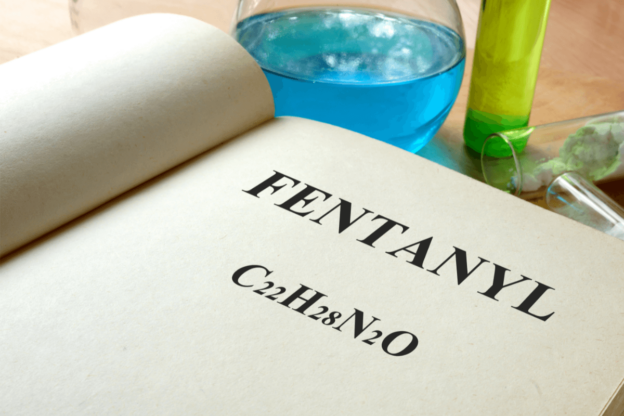Fentanyl and other synthetic opioids have created a health crisis that has touched too many families in the United States. The Centers for Disease Control estimates that there were approximately 81,083 synthetic opioid drug overdose deaths in 2023 alone.[1] That staggering number comes after ten years of steadily increasing overdose deaths.[2] Fortunately, drug treatment in Greenwich is helping to reduce overdose deaths in Connecticut.
Buying illicit drugs has never been safe behavior, but the potential of unknowingly buying drugs laced with fentanyl is a new danger those with substance use disorders now face. From fake pills to adulterated cocaine, fentanyl can find its way into street drugs in a variety of ways.
The only sure way to prevent a fentanyl overdose is to stop using substances. Addiction treatment centers provide the resources and support needed to help you get healthy and maintain recovery for a lifetime. Here’s what you need to know.
What Is Fentanyl?
Synthetic opioids are made in a laboratory and activate the brain in the same way as naturally produced opioids, such as morphine and codeine. There are over 100 different medications and substances containing synthetic opioids. Two of the most well-known are oxycontin and fentanyl. Both of these drugs have important medical applications, but they are also highly addictive drugs.
Fentanyl was developed for use as a post-surgical painkiller and is around 50 times stronger than heroin and 100 times stronger than morphine. The extreme potency of the drug is what makes it so deadly, especially when people are taking it unknowingly.
Illegal synthetic fentanyl is often produced in Mexico, India, and China and imported into the U.S. in pills and powder form. Fentanyl and other opioids create a sense of euphoria, but only for a short time. They react with opioid receptors in the brain and gastrointestinal tract and regulate body functions such as:
- Mood
- Pain
- Stress
- Respiration
- Gastrointestinal functions
- The production of dopamine and other neurotransmitters
People who use opioids build up a tolerance quickly. They need larger and more frequent doses as tolerance grows to produce the same effects. Because there is no “quality control” with illicit drugs, people using opioids have no reliable way of knowing the potency of the substances they are buying. Doses of fentanyl that were safe yesterday could be deadly today.
Signs of Fentanyl Addiction
If you or someone you care about is showing the warning signs of fentanyl addiction, a rehab program with a focus on treating synthetic opioid use disorder can offer the best chance at lasting recovery.
These treatment programs are filled with caring, empathetic professionals who understand how easy it is to become addicted to opioids and how difficult it is to break the addiction cycle. Some of the addiction symptoms to be aware of include:
- Changes in daily routine, such as missing work or social appointments
- Sleep changes or falling asleep at the wrong times
- Mood swings
- Neglected personal hygiene
- A loss of interest in favorite activities
- Constricted pupils
- Flushed, itching skin
- Isolation and avoiding friends and family members
- Unexplained financial difficulties
- Being secretive or evasive
- Slurred speech
- Watery eyes
- Confusion
- Slurred speech
- Dry mouth
- Vomiting
- Needle marks on arms, hands, or legs
- The presence of drug paraphernalia, such as needles or pipes
Fentanyl use disorder can lead to several dangerous or painful side effects besides overdose. Heart problems, rapid breathing, mouth ulcers, shaking or twitching of the extremities, and abdominal pain are common.
Treatment can not only prevent a fatal overdose, but it may also prevent serious health conditions from developing. Opioid addiction is a medical issue that requires medical care.
Preventing Fentanyl Exposure
Healthcare workers and first responders face potential health hazards when they come in contact with synthetic opioids. Accidentally inhaling fentanyl powder or being stuck by a needle filled with a dose of fentanyl can cause rapid onset of respiratory depression.[3]
Employees at healthcare and treatment facilities communicate closely with EMS providers to share information about incoming patients. First responders are trained to assess the risk for hazards when they first encounter an overdose patient or a situation where illicit fentanyl use is suspected.
To help reduce their exposure, staff and healthcare personnel are advised to avoid drinking, eating, or using the bathroom in a work area where illicit fentanyl is present or suspected. Touching the eyes, mouth, or other orifices could cause fentanyl contamination.
Using universal precautions such as wearing gloves, masks, and frequent hand washing can also help emergency and healthcare workers avoid accidental contact with the drug. Reducing exposure to fentanyl and other dangerous substances is part of a greater movement to keep medical workers and others safe without compromising the treatment of those in need.
Drug Treatment in Greenwich, CT: Reducing Fentanyl-Related Overdoses
In response to the large number of fatal overdoses, the CDC has issued a health alert advisory to help first responders, harm reduction specialists, and other health professionals reduce the number of overdoses. Expanding the distribution of naloxone (Narcan) — an opioid antagonist — is key.
Naloxone can reverse an opioid overdose and comes in both spray and injectable forms. This medication is available in most states without a prescription and can be administered without medical training. While it can cause side effects, naloxone is life-saving in the case of opioid overdose.
The Drug Enforcement Administration points out that fentanyl pills come in a variety of colors, shapes, and sizes and are not always easy to identify. To combat this, fentanyl strips (FTS) are a relatively new tool that detects fentanyl in a variety of drugs.[4] The strips are considered a harm-reduction strategy that warns people if their drug supply has been tainted with fentanyl.
FTS are not foolproof. They aren’t always accurate, and they can’t detect how much fentanyl is present. Instead, they only detect whether a sample contains fentanyl. However, fentanyl strips are still a valuable tool for preventing overdose by helping people detect substances that have been laced with fentanyl.
Other ways to reduce the risk of overdose include:
- Avoid mixing drugs
- Keep naloxone on your person at all times, and let others know you have it
- Don’t assume a drug source will continue to be safe because it was in the past
- Don’t use opioids or other drugs alone
It’s vital to get treatment for substance abuse and mental health disorders that contribute to your drug use, as entering recovery can be the best way to prevent overdose.
Finding Effective Drug Treatment in Greenwich
Connecticut residents searching for drug treatment in Greenwich can turn to the skilled team at Connecticut Center for Recovery. Our motto, “Recovery With Dignity,” represents our deeply held belief that every person deserves quality addiction treatment, regardless of their past. We understand that many factors are involved with the development of a substance use disorder, including trauma, genetics, and mental health concerns.
Because there are multiple pathways to addiction, our outpatient programs follow a holistic model of recovery that considers the needs and health of the whole person, not just their list of symptoms. We offer comprehensive, evidence-based solutions, including cognitive-behavioral therapy and relapse prevention programs.
Deciding to get treatment can be one of the most rewarding decisions of your life. Call the Connecticut Center for Recovery today to learn how our programs can help you meet your wellness goals.
Sources:
[1] https://www.cdc.gov/nchs/pressroom/nchs_press_releases/2024/20240515.htm
[2] https://usafacts.org/articles/are-fentanyl-overdose-deaths-rising-in-the-us/#footnote-1
[3] https://www.cdc.gov/niosh/topics/fentanyl/healthcareprevention.html
[4] https://www.cdc.gov/stop-overdose/safety/index.html

Alexis earned both a B.S. in Psychology and a B.S. in Family and Child Sciences from Florida State University and an M.A. in Marriage and Family Therapy from the University of San Diego. She holds licenses in Marriage and Family Therapy in Florida, Connecticut, and Massachusetts and is also a member of the American Association for Marriage and Family Therapy (AAMFT).
Alexis works with families, couples, children, and groups and also has a sub-specialty in addiction and recovery. She utilizes an integrated, systemic approach to counseling; empowering people to define what is not working for them in their lives and to discover the possibilities for making life work. In doing this, clients are guided towards identifying their strengths, accessing their resources, tapping into their potential for success, and taking action toward achieving their desired goals.
Alexis also has extensive experience in the administration of behavioral health organizations. She has developed, built, and supervised several facilities encompassing all levels of care while leading them through state licensing and The Joint Commission accreditation process.

